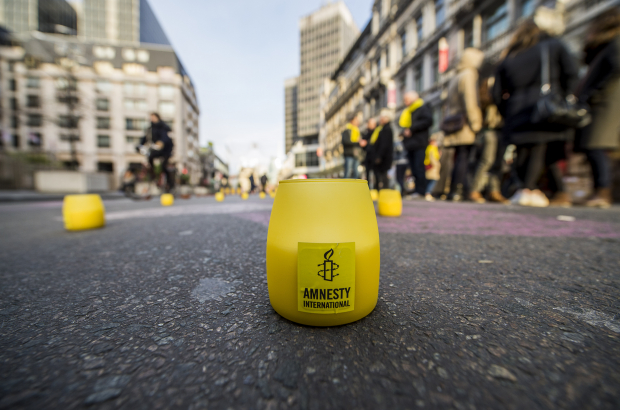- Daily & Weekly newsletters
- Buy & download The Bulletin
- Comment on our articles
Belgium heavily criticised in Amnesty International’s 2020 report
Amnesty International has released its 2020 annual report on the state of human rights around the world, and while the organisation praised the global public’s response to the coronavirus pandemic and the work carried out on the front lines, it was damning in its condemnation of nations and their political leaders for their failures. Belgium did not escape the harsh criticism.
The year 2020 was marked by the coronavirus pandemic and the measures put in place by the authorities. On the one hand, the Amnesty International report highlights the "heroism" of the population, from the healthcare workers and those who cleaned our streets, to those who cared for the elderly.
On the other hand, the report criticises the lack of leadership of our leaders and stresses that "the pandemic has also served as a revelation, highlighting the mediocrity, lies, selfishness and deceit of the world's political leaders," according to Agnès Callamard, Amnesty's new secretary-general.
Belgium is no exception and as well as being included in the list of countries to have failed in their leadership during the pandemic, several other negatives regarding human rights were highlighted in the report. In particular, Belgium failed to shine in areas such as health, asylum seekers, law enforcement and the right to privacy.
In terms of health, Amnesty highlights several state failures that were revealed when the pandemic broke. According to Amnesty, Belgium is guilty of "violations of residents' right to health, life and non-discrimination which have occurred as a result of government failures: structural deficiencies, lack of priority attention at the beginning of the pandemic, lack of access to hospitals, insufficient personal protection equipment for staff and too little screening."
"Between the start of the pandemic and the end of October 2020, it is estimated that nearly 11,500 people died because of Covid-19 in Belgium. For a population of about 11.5 million, this is a severe blow," the report said.
Last November, Amnesty released a report criticising the management of the crisis in Belgium’s nursing homes. The latest report continued with its condemnation by saying that "during the Covid-19 crisis, residents of nursing homes were denied transfer to hospitals and according to Médecins Sans Frontières (MSF), only 57% of serious cases were transferred to hospital during the crisis, compared to 86% before.”
“The lack of protective facilities in nursing homes, limited access to general practitioners, lack of testing and the impact of containment measures on the well-being of the elderly have had dramatic effects and have violated the right to health,” the 2020 report states.
The pandemic has also impacted the human rights of refugees in Belgium. In March, during the first wave, the authorities closed the asylum filing office. "Hundreds of people have been temporarily denied access to the asylum procedure, resulting in a lack of food aid and shelter," Amnesty International said. "The authorities set up an online registration system, which has proved unsatisfactory. In more than 100 cases, the Labour Court has ordered the Federal Agency for the Reception of Asylum Seekers (Fedasil) to guarantee access to material assistance for asylum seekers."
Problems have also arisen in the country's prisons because of coronavirus control measures. Measures have restricted the rights of detainees, including provisions that have reduced the possibility of contact with the world, noted Amnesty, which continues to denounce the overcrowding in Belgian prisons. "Measures taken in the context of the fight against the pandemic, including provisional releases, early releases and parole, have temporarily reduced overcrowding," the organisation noted. But this is compounded by problems of "sufficient access to basic services, including health care and sanitation."
In the context of the fight against coronavirus, Amnesty said, the Belgian authorities have collected more personal data. "Privacy experts and civil society organisations have called for safeguards to be put in place to protect the right to privacy, including ensuring that data that allows people to be identified is quickly erased," Amnesty wrote.
Amnesty International also pointed out that the "Stop Ethnic Profiling" platform launched in June has denounced an increase in ethnic profiling practices by police during confinement. In July, four local police stations adopted a framework setting out the modalities for work without ethnic profiling, Amnesty said.
In addition, Amnesty pointed to two cases as being linked to "excessive use of force". This is the case of the death of young Adil, which occurred last April. The 19-year-old "died after a chase with police in Brussels. He had fled for fear of being fined for failing to comply with COVID-19 restrictions. His scooter collided with a police car," the report said.
The second case is the case of Jozef Chovanec, the Slovak national who died after being arrested at Charleroi airport in 2018. The video of his detention, which had been leaked via social media, shows a particularly violent altercation between the man and the police can be seen.
Chovanec is then subdued while a policewoman performs a Nazi salute. As a result of this altercation the Slovak had a heart attack and died later in hospital. "A judicial investigation is under way," the NGO's report said.
Excluding the effects of the pandemic on human rights, Belgium was given further black marks. Amnesty especially singled-out the export of Walloon arms to Saudi Arabia, which it described as “irresponsible".
"The Walloon Region continued to grant arms transfer authorisations to the Saudi-led coalition operating in Yemen amid concerns that these weapons could be used to commit or facilitate serious violations of international human rights and humanitarian law,” Amnesty wrote. “In reviewing an appeal brought by NGOs, the Council of State has cancelled several of these export licences."
















Comments
I like Amnesty, but maybe it should focus its energy on countries where democracy doesn't exist, where people are jailed, tortured, killed just for thinking differently. Belgium might not be perfect, but it's way better than many other countries.